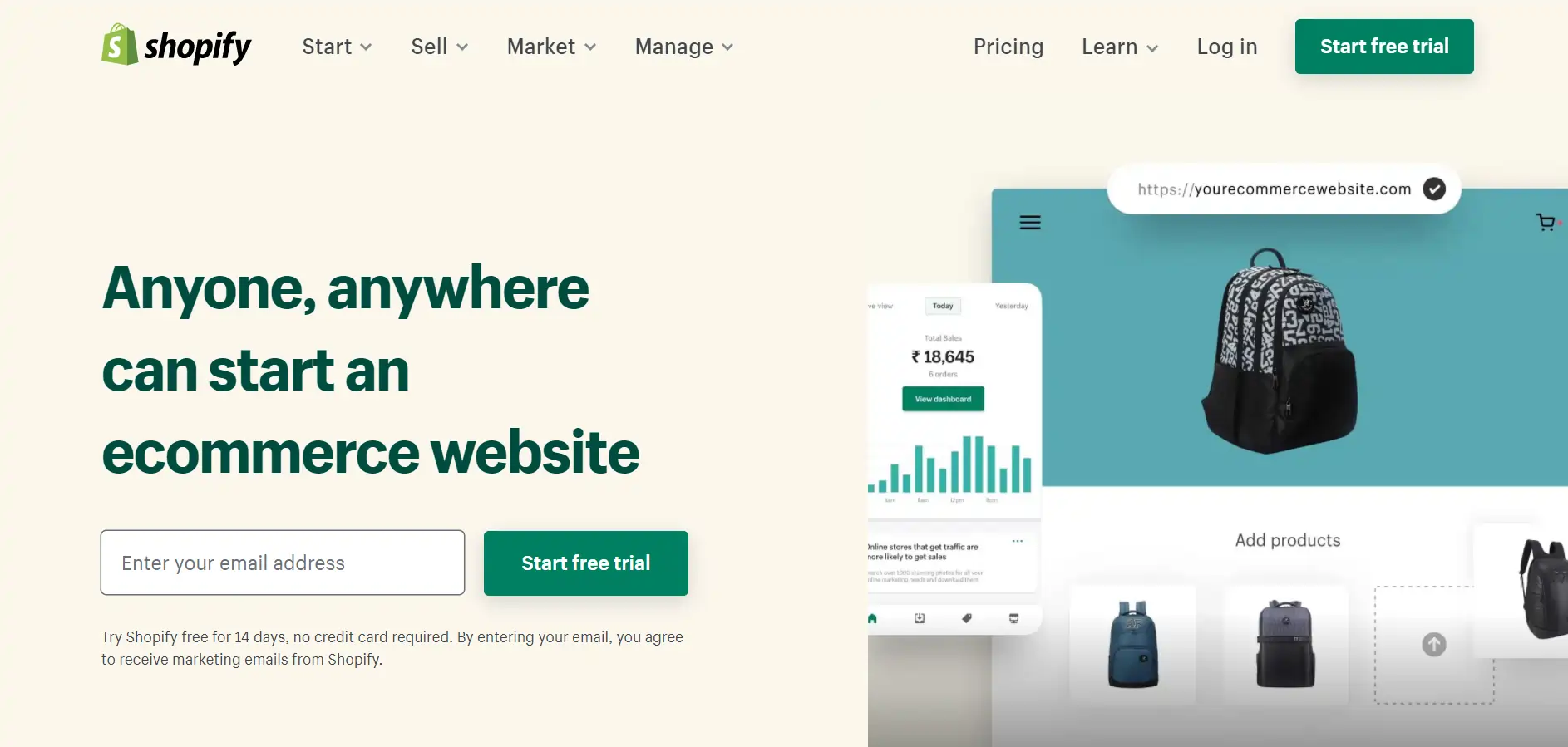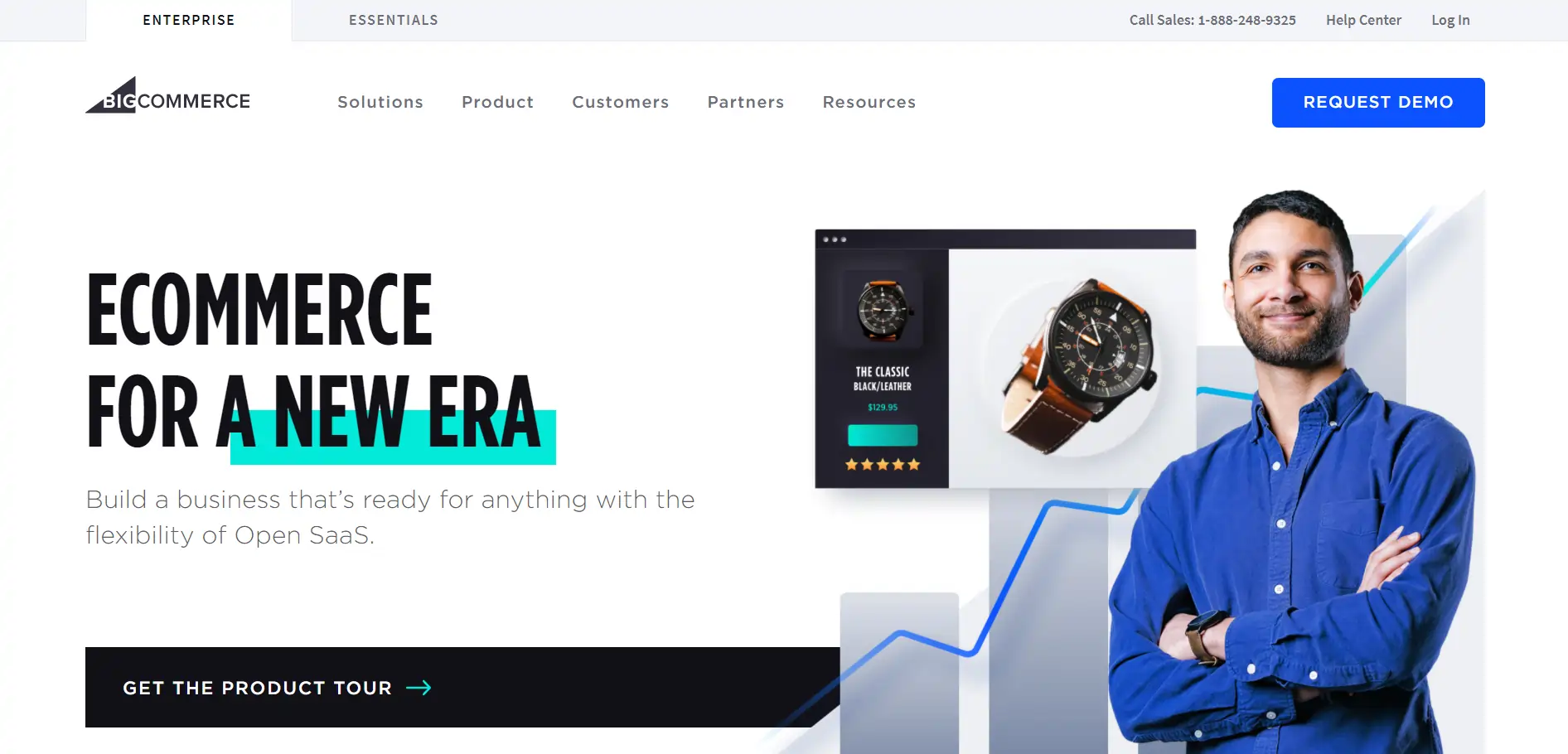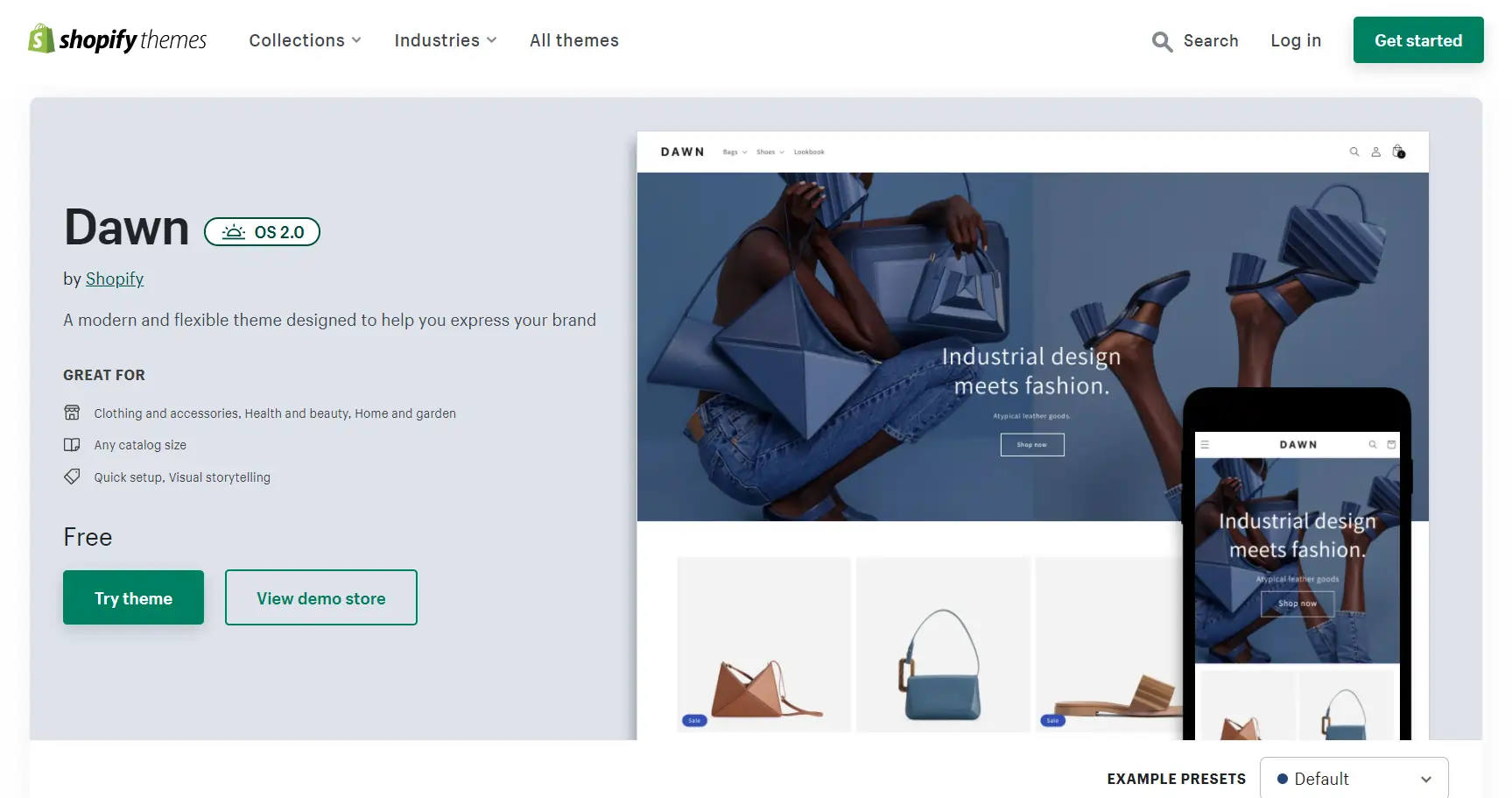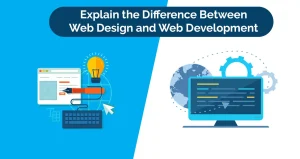Introduction
In the United States, E-commerce sales are expected to reach $740 billion by 2023. A rise in online purchases has motivated people to launch a scalable online business, but then it is critical to decide upon the right eCommerce platform that enables you to launch an online store with minimum investment and utmost ease. For this reason, we will help you figure out which is the right eCommerce platform for you to launch your online store. The two major ones are "Bigcommerce and Shopify.”
This detailed blog about Bigcommerce vs Shopify will help you figure out the: Critical differences between Bigcommerce vs Shopify Pros & Cons of Bigcommerce and Shopify Bigcommerce vs. Shopify, which is ideal for your business type? Let's continue to compare Bigcommerce and Shopify to understand what these two platforms are all about.
Interested in our ecommerce Website Development Solutions
- Tailor-made eCommerce Website Development
- Drive Customer Engagement
- Simplify Your Users’ Buying Journey!
Know Everything About Bigcommerce & Shopify
Bigcommerce and Shopify are both online store builders that let you sell both physical and digital goods. They're mainly targeted at those willing to establish a business without a massive budget — those who wish to build an internet store independently. Both products work in a web browser, which means you don't need to install any software on your computer and manage your business remotely. The main idea behind these platforms is to create an online store with utmost ease and with minimum capital investment.
What Makes Shopify Much Loved Online Store Builder?

- Over a million people utilize Shopify.
- With a 23 percent market share in the United States, it is one of the most popular eCommerce platforms on the planet.
- With over 6000 apps accessible on the Shopify App Store to tailor the user experience, it's very adaptable and simple to use
- The Shopify platform is used by 1.75 million merchants and 1.59 million live websites (Source: Backlinko)
- Shopify stores now operate in 175 countries around the world.
What Makes Bigcommerce A Success Story

As of June 2020, BigCommerce served 60,000 online stores in 120 countries.
Post-2019, the revenue of BigCommerce grew to 112.103 million. During the first quarter of 2020, the revenue went up by 30%, bringing the numbers to $33.2 million. The current estimated annual revenue is $23.5 million per year.
It is vital to understand the difference between the two platforms and which one will work best for you with such encouraging numbers. So let’s know which is better: Shopify or Bigcommerce!
Bigcommerce Vs. Shopify: Which One Should You Eye On?
While talking about Bigcommerce vs Shopify, we will take a look at a lot of critical areas like Pricing, transaction fees, sales, product, and design, which will help you decide the right platform for your business type.
1. Design Templates That’s Extraordinary!

While discussing Bigcommerce vs. Shopify, one of the critical areas to consider is the kind of templates the platforms offer. Professional web development companies can assist you with coming up with the best kind of design template that lives up to your brand image.
- BigCommerce's free templates are a little easier to optimize because of its page builder functionality: A drag-and-drop interface is offered that allows you to change the content of pages more efficiently. For example, you can change the layout of your home page with a similar editor in Shopify, but you'll have to pay for an app like Buildify ($12.99 a month) to get this functionality.
- You can buy a "premium" theme from Shopify or BigCommerce in addition to the free layouts. BigCommerce has a total of 160 premium themes. They range in price from $150 to $300. Shopify presently has 72 premium templates ranging in price from $100 to $180.
- The theme of Shopify templates varies a lot from each other compared to Bigcommerce, with minimal differences in themes offered.
- Another advantage of Shopify's template is the ease of searching for templates. A variety of criteria help to assist you in selecting a template based on industry type and design. In addition, BigCommerce makes it easy to personalize page layouts by allowing you to drag and drop items around as per your preference.
- With Shopify, you get access to many fonts that you may use in the free templates. In BigCommerce, on the other hand, the font selection offered with each of the free themes might be restricted.
2. Pricing That’s Pocket-Friendly!

One of the key factors that users look into while deciding between Bigcommerce vs Shopify Pricing. So let's take a closer look at it.
Bigcommerce vs Shopify - Pricing for BigCommerce
BigCommerce has four different pricing options:
- $29.95 per month for BigCommerce Standard
- $79.95 per month for BigCommerce Plus
- $299.95 per month for BigCommerce Pro
- BigCommerce Enterprise: costs vary according to the needs
When you pay for a year in advance, you can get a 10% discount on the 'Plus' and 'Pro' plans, as well as a 15-day free trial.
Bigcommerce vs Shopify - Shopify Pricing
Shopify offers five pricing plans:
- Lite: $9 per month
- Basic Shopify: $29 per month
- Shopify: $79 per month
- Advanced Shopify: $299 per month
- Shopify Plus: pricing varies depending on requirements
When you pay for a year in advance, you will receive a 10% discount, and when you pay in advance for two years, you will receive a 20% discount.
- While discussing Bigcommrce vs Shopify pricing, even Shopify, like BigCommerce, offers a 14-day free trial.
- Shopify Plus and BigCommerce Enterprise are enterprise-grade versions of the platforms, aimed at significant organizations or store owners with high sales volumes. Many advanced features, such as Advanced API support, security features designed to satisfy the client's requirements. There are also many customized solutions available for enterprise-level accounts. As a result, the cost of a BigCommerce Enterprise or Shopify Plus plan differs depending on the customer’s needs.
- Crucial price comparison between the Bigcommerce vs Shopify - Standard version of BigCommerce vs. Shopify the 'Basic' version is the additional features. The 'Basic Shopify' plan costs $29 per month, compared to the 'BigCommerce Standard' plan, which costs $29.95.
- Both platforms Bigcommerce vs Shopify allow you to sell an infinite amount of products, with BigCommerce winning in terms of 'out-of-the-box capabilities in general. The $29 'BigCommerce Standard' plan includes a few key features that you won't find on the corresponding 'Basic Shopify' plan, including professional reporting capabilities, a built-in system for rating and review, a drag-and-drop page builder, currency conversion is done automatically (based on geolocation).
- When it comes to ratings and reviews, it's worth noting that none of Shopify's plans include this feature; you'll have to use third-party software to handle this. Fortunately, Shopify offers free software for this (aptly named "Product Reviews").
- To clarify Bigcommerce vs Shopify, although BigCommerce's $29 package has more capabilities, the 'Basic Shopify' plan offers significant advantages. For example, the Shopify plan has no sales limits; the BigCommerce Standard plan, on the other hand, has a limit to sales of $50,000 per year. Also, Shopify has an abandoned cart saver, which sends emails to individuals who leave your site in the middle of a transaction, a valuable feature that may significantly boost your store's earnings.
3. Selling In Multiple Currencies
When deciding over Bigcommerce vs Shopify, remember if you sell as per the currency of your users, you will often obtain more online sales. Unlike many other e-commerce platforms, Shopify and BigCommerce both make this possible.
- Install a free 'Geolocation App' that prompts your visitors to select their preferred location to enable multi-currency selling in Shopify.
- This feature is now available in Shopify only if you have a Shopify Plus membership. All BigCommerce free themes, on the other hand, allow for automated currency conversion based on IP.
4. Blogging That Delivers!
When talking about marketing for your online store and choose between Bigcommerce vs Shopify, blogging is one of the best ways to drive visitors to a store. Both Shopify and BigCommerce make it simple to start a blog. You may import material from an existing blog into BigCommerce and Shopify using the BigCommerce' Blog Sync' and Shopify ‘Blogfeeder Apps’.
You can always connect a third-party blog (such as a WordPress one) into either platform if your blogging demands are complex.
5. Fees for transactions
One of the critical questions in the mind of users is the transaction fees, which is how much percentage Bigcommerce vs. Shopify charges on the sales or the transaction fee per sale.
- BigCommerce comes out on top here since it charges 0% transaction costs on all of its plans. Shopify also charges 0% on all plans, but only if you use its own 'Shopify' Payments. Transaction costs occur if you don't utilize Shopify Payments. They vary depending on the plan you're on (2 percent for 'Shopify Lite' and 'Basic Shopify,' 1 percent for 'Shopify,' and 0.5 percent for 'Advanced Shopify').
6. Limitation On Sales
Concerning Sales, to compare Bigcommerce vs Shopify both have certain limitations, as mentioned below:
- Sales on BigCommerce's 'Standard' plan are capped at $50,000, $180,000 on the 'Plus' plan, and $400,000 on the 'Pro' plan. Your sales restrictions are branded as "Custom" if you're using BigCommerce Enterprise, which means they're changeable.
- The benefits with Shopify, unlike BigCommerce, there are no sales limits, and the $29 plan includes abandoned cart saving features.
7. Secure Payment Gateways
The payment gateway allows customers to make online payments. Both Shopify and BigCommerce will enable you to connect a wide range of payment gateways to your store. Both platforms support the major ones, such as Paypal, Worldpay, and Quickbooks. Shopify, however, has a lot more options, which supports over 100 platforms compared to BigCommerce.
8. Extended Product Categories To Suit Every Business Need!

While we talk about Bigcommerce vs Shopify, setting up product categories in Shopify and BigCommerce is simple enough.
However, Shopify has some smart elements that make the process much easier.
- With Shopify, you can manually add products to the overall collections and create easy tools like "SMART" ones that automatically add products based on the conditions you have filled in. You can use various criteria to populate a collection, such as product title, tags, price, weight, and more. So when you have multiple products to upload, this feature is of great help.
- With Bigcommerce, you have a 'bulk edit' option for speeding up category assignment; it does not currently match “Smart Collection' capability. Therefore Shopify is better for defining and managing product categories.
9. Product Options And Variants
Variants are the number of product choice combinations you can offer, such as a dress in multiple sizes and colors. To compare Bigcommerce and Shopify product variants places an important role:
- Customers can only choose from three sets of options per product with Shopify, such as color, size, and material. Setting these alternatives up is simple, but it might be a pain if you need to sell things with more than three variations.
- BigCommerce, allows you to create substantial product lists with up to 250 options. If your products come in various forms, colors, and sizes, BigCommerce will provide you with the versatility you require.
- With BigCommerce, you can have 600 product variants/options as compared to 100 with Shopify. So, if you're working with many product variations and variants, BigCommerce is a winner.
10. Fast & Easy Image Uploads
When selling products that require you to upload an image, you'll find that this functionality works efficiently with BigCommerce. However, with Shopify, you'll have to resort to a bit of coding or a third-party app.
11. Shipping Options That’s Scalable
Both Shopify and BigCommerce and Shopify allow you to set up free shipping rates, flat rates, price-based rates, weight-based rates, and real-time shipping rates.
- BigCommerce has an advantage when it comes to third-party real-time shipping prices, as you may use it on any of its plans, but Shopify requires you to be on the $299 'Advanced Shopify' plan to do so.
- When using "Shopify Shipping," which is accessible on all plans, users get tremendous discounts.
12. Abandoned Cart Recovery Is Crucial
In a BigCommerce vs. Shopify comparison, the ability to recover abandoned carts is something to look out for. But, again, this is a beneficial tool that allows you to send emails to visitors to your site who add something to their basket but do not finish the transaction.
- BigCommerce's abandoned cart saver, which promises to be able to recover 15% of lost transactions, is arguably a little better than Shopify's.
- Unlike Shopify, which only allows you to send one automated email to users who abandon their cart, Bigcommerce will enable you to send several automated emails to users who abandon their cart.
- Abandoned cart saver is included in all Shopify plans, so you can obtain this vital feature for up to $70 cheaper per month than if you utilized BigCommerce.
13. Selling In Multiple Languages For Customized User-Experience
Selling in multiple languages will enable a personalized experience for the customers.
- Both Shopify and BigCommerce allow you to sell in many languages; however, while Shopify has built-in capabilities for this, BigCommerce requires installing a third-party tool called Weglot.
- Unless you're on the 'Shopify Plus' plan, which allows you to translate your site into up to 20 languages, Shopify allows you to convert your site into five languages.
14. Analytics That Help You Grow!
BigCommerce and Shopify both have a robust reporting suite. Customer reports, marketing-related analytics, and financial statements can be easily generated.
- Shopify allows you to build custom reports (available exclusively on the 'Advanced Shopify' and 'Shopify Plus' plans). In addition, BigCommerce offers an 'E-commerce Insights' report that provides you with more extensive information on your customers, goods, and abandoned carts for an additional price.
- BigCommerce's 'extra fee' is quite expensive, costing $49 per month for the 'Standard' and 'Plus' plans, $99 for the 'Pro' plan, and $249 for the 'Enterprise' plan.
- When it comes to reporting, BigCommerce has a considerable advantage over Shopify because all BigCommerce plans include most report types as standard.
- To use Shopify's complete reporting tools, you must be on a more expensive plan, such as the $79 per month 'Shopify' plan or higher. However, if you have a Shopify subscription that is less expensive, you can access some Shopify statistics through an 'online store dashboard.'
15. Email Marketing Tools That Never Fails To Deliver!
Email marketing is a crucial aspect of establishing an online store. It is critical to send e-newsletters to your mailing list to generate sales.
- Shopify has launched a feature called 'Shopify Email,' which lets you send emails without leaving the platform. It's also inexpensive: as part of your ordinary plan, you can send 2,500 emails every month; after that, you'll be charged $1 per 1,000 emails sent.
- BigCommerce customers would require two products to manage e-commerce and email marketing.
16. App Stores That’s Enormous!
Both Shopify and BigCommerce have an app store that allows you to link the platforms with other online applications or add capabilities to your store.
- Shopify's app store has a substantially more significant number of apps than BigCommerce; whereas BigCommerce has roughly 1,000 apps, Shopify has over 6,000.
17. Scalable Pos Solutions
Both Shopify and BigCommerce support the usage of mobile devices for point-of-sale (POS) transactions.
- All of your customer and order information is synced with the back end of your online store, ensuring that everything is in order. You'll need to incorporate hardware from a third-party platform, such as Vend, Clover, Square, Hike, or Heartland Retail, to use POS with BigCommerce.
- POS with Shopify, on the other hand, works with POS plans available directly from Shopify.
18. Mobile Apps Are An Added Advantage!

Shopify is arguably the winner of mobile apps, with more apps and features to manage your store on the go.
- Shopify's two primary apps are Shopify and Shopify POS, both of which are accessible on iOS and Android. The first allows you to handle the basics of your business, and the second is designed to assist you with selling via Shopify in a physical place like accepting credit card payments, sync products, email receipts, etc.
- Among the Shopify apps that can help you with various aspects of setting up an online store include a customer chat app ('Shopify Inbox,' a logo maker, a local delivery app, a business card creation app)
- BigCommerce also has a mobile app that you can use to handle orders, view and contact customers, and monitor basic statistics.
19. SEO That Is Meant To Derive Results!
On the SEO front, both BigCommerce and Shopify perform admirably.
- In both Shopify and BigCommerce, SEO is simple to manage – updating page titles and meta descriptions, as well as adding headings and alt text is a breeze.
- Creating page redirects is likewise simple, with Shopify having a slight advantage in this regard because it generates the redirect for you whenever you modify a page's URL.
- Both e-commerce platforms also include a free SSL certificate, which Google's search engine algorithm values.
- For starters, it makes it easier to establish Google-friendly URLs. Although you can change your Shopify URLs to include keywords and be relatively short, they won't be perfect because the platform prefixes your pages, blog posts, and items.
- BigCommerce, on the other hand, lets you make much shorter URLs which Google prefers.
20. Buy Buttons That Can Easily Be Installed
Both Shopify and BigCommerce include "Buy buttons" that let you sell your products on other websites.
- With Shopify, you copy code from the buy button and paste it into another blog, website, or social media profile wherever you want to sell; with BigCommerce, you must first install the "Buy" button' app.
- In one essential aspect, Shopify's "Buy Button '' outperforms BigCommerce: you can use it to embed entire catalogs as well as individual products.
- BigCommerce's 'Buy Button' is preferable for selling in other currencies because it automatically displays your product's pricing and checkout in the local currency if you have multi-currency functionality enabled.
21. Customer Support For Your Ease!
Customer support options on Shopify and Bigcommerce are similar, including contact, chat, FAQs, and email.
- Customer care is available 24 hours a day, seven days a week via phone, email, and live chat. Before receiving a phone number or email address from the support team, fill out a form and review the BigCommerce website's alternate solutions.
- Shopify also offers customer care 24 hours a day, seven days a week. And, like BigCommerce, you must first look for solutions to your difficulties before accessing the contact information you require. Shopify provides phone support through a "callback" system in which you provide your phone number and email address.
22. Security That’s Unmatched!
BigCommerce and Shopify both provide free SSL certificates with all of their plans. When you choose to upgrade to a more comprehensive SSL certificate through BigCommerce. The cost of a purchased SSL certificate with BigCommerce ranges from $59 to $299. BigCommerce and Shopify are both PCI DSS certified, meaning they meet the Payment Card Industry Data Security Standard's requirements for preventing credit card data breaches.
23. Product Customization Is Critical
BigCommerce allows you to customize your products, whereas Shopify only allows you to choose from three alternatives.
Bigcommerce Vs. Shopify: Which One Do You Prefer?
In the end, BigCommerce and Shopify are very well-matched store builders, with BigCommerce winning in product selections, reporting, multi-currency selling, and SEO, and Shopify winning in designs, abandoned carts recovery, email marketing, and app connections.
BigCommerce vs. Shopify: Pros and Cons
Shopify
|
|
Pros
|
Cons
|
- Less design work for you with Shopify's unique theme options Thousands of tools to pick from in a high-quality app store
- With Shopify's intuitive dashboard, managing your website is a breeze
- Social media integration is simple, and SEO aids in product promotion
- User-friendly UI that is modern and self-explanatory
- Supports selling via numerous channels, including Facebook, Instagram, and other social media sites
|
- Transaction costs apply unless using Shopify Payments
- Poor for international scalability as it is reliant on third-party apps for multi-currency support
- Changing templates necessitates redesigning your website
- Minimal Product attributes close to 3
- Certain countries like Australia, Germany, Canada, Ireland, the US, New Zealand, Hong Kong SAR China, Japan, The Netherlands, Singapore, Spain, and the UK permit Shopify Pay. However, other locations must depend on other payment methods.
|
BigCommerce
|
|
Pros
|
Cons
|
- It has a tonne of built-in sales capabilities that don't require installation
- No transaction fees on any plan
- Each product can have up to 600 versions
- Can use themes to suit, and it lets users code the theme using HTML/CSS Editor for personalization.
|
- Advanced features have a slight learning curve.
- There isn't much diversity between different store templates
- Feature options aren't as configurable as Shopify's
- Its features are costlier and not available as a free entry-level plan.
|
What Type Of Business Is Shopify & BigCommerce Best For?
The right platform depends upon your business needs, budget, and timeline. Here are some factors to consider:
- Shopify themes with capabilities like multi-tag filtering and a customizable collections organization system can help stores with vast inventories organize their products.
- Many Shopify themes also allow you to develop robust menu navigation systems, essential for selling a wide range of products.
- Shopify is also a fantastic choice for store owners that have a general notion of how they want their store to look but aren't too picky. Hundreds of professionally designed Shopify themes are available for free, all of which provide store owners with extensive customization options for things like colors, fonts, basic layout adjustments, navigation, and more.
- Bigcommerce has developed a relatively decent B2B system for wholesale opportunities, which makes it stand out. BigCommerce's services are suitable for any form of e-commerce/e-retail business, whether a freelancer, a large, mid-sized, minor, or a startup. In addition, Bigcommerce's usability makes it an excellent fit for retailers of all levels of experience.
Final Thoughts on Difference Between Bigcommerce & Shopify!
Your business is your dream, your aspiration, and your ambition which deserves nothing less than the best. These consequent differences between Bigcommerce and Shopify will definitely let you launch and grow your business with the most suited platform. However, before putting in your money create a holistic business plan about how you want to launch the store, what will be the key products, what kind of features are most important, how much is the initial budget to invest, how much is the bandwidth. Read our blog about launching the online store that will get you the best steps to launch an online store with or without investment.
BigCommerce vs. Shopify FAQ
Which One Should I Use Bigcommerce Or Shopify?
The key advantages of BigCommerce over Shopify are that it doesn't charge any transaction fees and, in general, it comes with more e-commerce functions “Out of the box.” In contrast, Shopify frequently requires you to purchase apps to gain the functionality you desire. In addition, the key advantages of Shopify over BigCommerce are that its templates are more robust, there are no sales limits to worry about, and all of its plans have an abandoned cart saver function. Depending on your budget and the functionalities required, you may opt for any Bigcommerce vs Shopify.
Do I Need To Hire A Web Development Agency To Assist Me In Creating A Bigcommerce Or Shopify Store?
Both systems are "do-it-yourself" online store builders intended for people who do not have access to a computer. However, when you consider working with a web development company, you get a holistic solution starting with store creation, launch, marketing strategy, reporting, and much more.
Interested in our Web Design & Development Services?
- Achieve Your Brand Vision
- Drive Customer Engagement
- Customize UI for Intuitive Digital Interactions









A
Your blog is very nice. Would like to see more like this. Thanks for sharing your information.
s
Nice blog! Thanks for sharing this blog with us. I like the article and it is very helpful for me. Thanks for sharing.